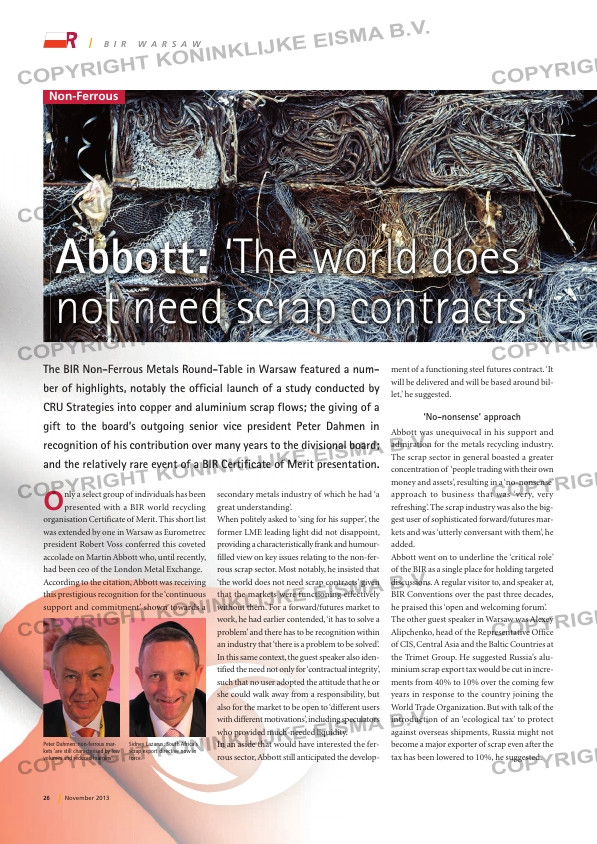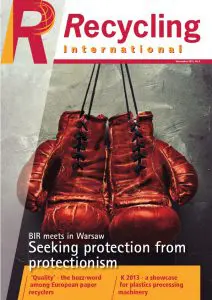Page 26 from: November 2013

26 November 2013
secondary metals industry of which he had ‘a
great understanding’.
When politely asked to ‘sing for his supper’, the
former LME leading light did not disappoint,
providing a characteristically frank and humour-
filled view on key issues relating to the non-fer-
rous scrap sector. Most notably, he insisted that
‘the world does not need scrap contracts’ given
that the markets were functioning effectively
without them. For a forward/futures market to
work, he had earlier contended, ‘it has to solve a
problem’ and there has to be recognition within
an industry that ‘there is a problem to be solved’.
In this same context, the guest speaker also iden-
tified the need not only for ‘contractual integrity’,
such that no user adopted the attitude that he or
she could walk away from a responsibility, but
also for the market to be open to ‘different users
with different motivations’, including speculators
who provided much-needed liquidity.
In an aside that would have interested the fer-
rous sector, Abbott still anticipated the develop-
ment of a functioning steel futures contract. ‘It
will be delivered and will be based around bil-
let,’ he suggested.
‘No-nonsense’ approach
Abbott was unequivocal in his support and
admiration for the metals recycling industry.
The scrap sector in general boasted a greater
concentration of ‘people trading with their own
money and assets’, resulting in a ‘no-nonsense’
approach to business that was ‘very, very
refreshing’. The scrap industry was also the big-
gest user of sophisticated forward/futures mar-
kets and was ‘utterly conversant with them’, he
added.
Abbott went on to underline the ‘critical role’
of the BIR as a single place for holding targeted
discussions. A regular visitor to, and speaker at,
BIR Conventions over the past three decades,
he praised this ‘open and welcoming forum’.
The other guest speaker in Warsaw was Alexey
Alipchenko, head of the Representative Office
of CIS, Central Asia and the Baltic Countries at
the Trimet Group. He suggested Russia’s alu-
minium scrap export tax would be cut in incre-
ments from 40% to 10% over the coming few
years in response to the country joining the
World Trade Organization. But with talk of the
introduction of an ‘ecological tax’ to protect
against overseas shipments, Russia might not
become a major exporter of scrap even after the
tax has been lowered to 10%, he suggested.
B I R W A R S A W
Peter Dahmen: non-ferrous mar-
kets ‘are still characterised by low
volumes and reduced margins’.
Sidney Lazarus: South Africa’s
scrap export directive now in
force.
Non-Ferrous
Abbott: ‘The world does
not need scrap contracts’
Only a select group of individuals has been presented with a BIR world recycling
organisation Certificate of Merit. This short list
was extended by one in Warsaw as Eurometrec
president Robert Voss conferred this coveted
accolade on Martin Abbott who, until recently,
had been ceo of the London Metal Exchange.
According to the citation, Abbott was receiving
this prestigious recognition for the ‘continuous
support and commitment’ shown towards a
The BIR Non-Ferrous Metals Round-Table in Warsaw featured a num-
ber of highlights, notably the official launch of a study conducted by
CRU Strategies into copper and aluminium scrap flows; the giving of a
gift to the board’s outgoing senior vice president Peter Dahmen in
recognition of his contribution over many years to the divisional board;
and the relatively rare event of a BIR Certificate of Merit presentation.
RI-9-BIR Non-Ferrous.indd 26 11-11-13 09:57



